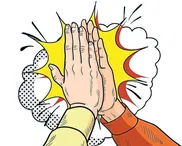In the last 20 years something like 70,000 people have come to Christ in Ethiopia.
This is a story untold by the secular media, but it is a vibrant movement of God’s Spirit in this land presently facing food shortages. Most of the people whose lives have been touched are from an Orthodox Church background, but many Muslims have found Christ too. Those who have seen what the Lord has been doing have been astonished.
The book in the monastery
The story of the gospel in Ethiopia begins in Acts 8 with Philip preaching to the Ethiopian eunuch, an important treasury official from the court of Queen Candace. But the gospel was revitalised in the country during the 19th century by Samuel Goldblatt and a very interesting story began to unfold. Goldblatt was a Lutheran missionary who stayed only about six years in Ethiopia, but translated the New Testament into the Ethiopian language, Amharic.







